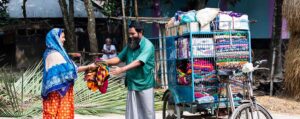 “Whatever you need, we can deliver. In fact, we will save you the trouble of going all the way to the main bazar. On top of it, you get clothes for 5 percent cheaper”, when Lipi (34), founder of ‘Hasilkandi Mini Garments’ says that to her customers with a confident smile, it is difficult to imagine that her business is only 2 years old. Work opportunity is very limited in the Hasilkandi village and it is even more challenging for the women owing to restricted mobility and lack of opportunities to learn profitable skills. However, Lipi and her team have risen above all these constraints and are generating sustainable income. When asked about how it all happened, Lipi narrated her story.
Lipi had only passed SSC when her parents got her married off to Mohsin, a day laborer who works in Dhaka. Unable to continue her education due to family restrictions, Lipi had to concentrate on running the family with Mohsin’s limited income (about USD 108.6) who used to be away in Dhaka for most part of the year. But as her elder daughter and 2 sons started attending schools, the expenses kept rising. Especially when her daughter was about to sit for her SSC exam , Lipi realized that her husband’s monthly income was not enough to afford the tuitions that her sons and daughters will eventually require. Lipi did not want to turn to anyone for financial help compromising her dignity, but her inability to provide for her children and to save for future left her yearning for income opportunities.
In 2016, Lipi was registered as one of the participants of CARE Bangladesh’s Strengthening Household Ability to Respond to Development Opportunities (SOHUHARDO) III program. She received training on tailoring and a cash grant of 37 USD. She learnt how to make clothes for all ages but most importantly she picked up invaluable lessons on issues such as market assessment, creating market linkage and increasing the rate of returning customers through cordial customer service.
With her cash grant, she bought a sewing machine and started reaching out to her neighbors for tailoring work. However, Lipi was not the only female tailor in her neighborhood and it came to her notice that none of the tailors were getting enough clients individually for a steady income. She quickly realized that there is benefit in collaboration and reached out to three other fellow SHOUHARDO III participants with her offer. Within a few months, they collectively rented a space for USD 6 in the nearby marketplace and invested another USD 70 for setting up. Thus ‘Hasilkandi Mini Garments’ was open for business. As a team, their pla
“Whatever you need, we can deliver. In fact, we will save you the trouble of going all the way to the main bazar. On top of it, you get clothes for 5 percent cheaper”, when Lipi (34), founder of ‘Hasilkandi Mini Garments’ says that to her customers with a confident smile, it is difficult to imagine that her business is only 2 years old. Work opportunity is very limited in the Hasilkandi village and it is even more challenging for the women owing to restricted mobility and lack of opportunities to learn profitable skills. However, Lipi and her team have risen above all these constraints and are generating sustainable income. When asked about how it all happened, Lipi narrated her story.
Lipi had only passed SSC when her parents got her married off to Mohsin, a day laborer who works in Dhaka. Unable to continue her education due to family restrictions, Lipi had to concentrate on running the family with Mohsin’s limited income (about USD 108.6) who used to be away in Dhaka for most part of the year. But as her elder daughter and 2 sons started attending schools, the expenses kept rising. Especially when her daughter was about to sit for her SSC exam , Lipi realized that her husband’s monthly income was not enough to afford the tuitions that her sons and daughters will eventually require. Lipi did not want to turn to anyone for financial help compromising her dignity, but her inability to provide for her children and to save for future left her yearning for income opportunities.
In 2016, Lipi was registered as one of the participants of CARE Bangladesh’s Strengthening Household Ability to Respond to Development Opportunities (SOHUHARDO) III program. She received training on tailoring and a cash grant of 37 USD. She learnt how to make clothes for all ages but most importantly she picked up invaluable lessons on issues such as market assessment, creating market linkage and increasing the rate of returning customers through cordial customer service.
With her cash grant, she bought a sewing machine and started reaching out to her neighbors for tailoring work. However, Lipi was not the only female tailor in her neighborhood and it came to her notice that none of the tailors were getting enough clients individually for a steady income. She quickly realized that there is benefit in collaboration and reached out to three other fellow SHOUHARDO III participants with her offer. Within a few months, they collectively rented a space for USD 6 in the nearby marketplace and invested another USD 70 for setting up. Thus ‘Hasilkandi Mini Garments’ was open for business. As a team, their pla
 n was simple: Attract the customers with higher quality of work but with relatively cheaper price. Soon they established themselves as tailor house where customers started flocking in to create their customized shirts, 2 piece dresses (kamiz), Maxi dresses, mosquito nets, clothes for children and even tailored sanitary napkins. Lipi and her team started to take note of their customers’ preferences along with collecting information on fashion trend through regular visits to the local markets. Within a year, they started making ‘ready-made’ clothes for their customers. The team made linkage with shop owners in the nearby markets. In addition to that they reached out to salesmen. Thus, Hasilkandi Mini garments started making their own product lines and pushing them in the market.
n was simple: Attract the customers with higher quality of work but with relatively cheaper price. Soon they established themselves as tailor house where customers started flocking in to create their customized shirts, 2 piece dresses (kamiz), Maxi dresses, mosquito nets, clothes for children and even tailored sanitary napkins. Lipi and her team started to take note of their customers’ preferences along with collecting information on fashion trend through regular visits to the local markets. Within a year, they started making ‘ready-made’ clothes for their customers. The team made linkage with shop owners in the nearby markets. In addition to that they reached out to salesmen. Thus, Hasilkandi Mini garments started making their own product lines and pushing them in the market.
While walk-in customers and individual orders are still the main source of income of Hasilkandi Mini Garments, they have started making and selling ‘ready-made’ clothes through 5 salesmen. Mini Garments have also been serving as a trusted garments provider for some of the local business owners in the markets nearby. Lipi and her team currently makes about 82 USD per person every month. Their efforts have been taken notice by the Village Development Committee and they are currently attempting to make liaison with the local schools for school uniform orders. As she packs double collared shirts, quilt jackets for children and trendy women’s wear for her clients, Lipi doesn’t worry about her children’s education or her household savings anymore. Lipi says, “I am confident about steady growth of our business. Once we have enough savings we will have the financial freedom to take on some more high-risk, high-return investment plans”


